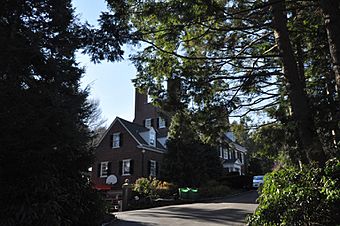George R. Minot House facts for kids
|
George R. Minot House
|
|

George R. Minot House in 2012
|
|
| Location | 71 Sears Road, Brookline, Massachusetts |
|---|---|
| Built | 1929 |
| Architectural style | Colonial Revival |
| NRHP reference No. | 76001976 |
Quick facts for kids Significant dates |
|
| Added to NRHP | January 7, 1976 |
| Designated NHL | January 7, 1976 |
The George R. Minot House is a special historic home in Brookline, Massachusetts. It is important because it was once the home of Dr. George R. Minot. He was a famous scientist who won a Nobel Prize for his medical discoveries.
The house itself is a brick building built around 1929. It has a style called Colonial Revival. This means it looks like older American homes from the colonial times. The house has two main floors and a smaller attached part. It also has chimneys on each end and a covered entrance at the front.
Contents
About George R. Minot
This house is famous because of Dr. George R. Minot (1885–1950). He was a brilliant doctor and researcher. In 1934, he won the Nobel Prize in Physiology or Medicine. This award is one of the highest honors a scientist can receive.
Dr. Minot won the Nobel Prize for finding a cure for pernicious anemia. This was a very serious blood disease. Before his discovery, people with pernicious anemia often did not survive.
Minot's Important Work
Dr. Minot spent many years studying different types of anemia. He did his most important research in the 1920s. At that time, he was the chief of medical services at a hospital in Boston.
He discovered that eating a special diet, rich in liver, could cure pernicious anemia. This was a huge breakthrough in medicine. His work saved many lives.
Dr. Minot continued his research on blood diseases for many years. He worked at the Thorndike Memorial Laboratory. He retired from his research in 1948.
Later Life and Honors
Dr. Minot faced his own health challenges. He had diabetes mellitus starting in 1921. Luckily, insulin was discovered soon after. This medicine helped him manage his diabetes.
Besides his research, Dr. Minot was also a full professor. He taught at Harvard Medical School. He was the first American to receive a special award from the Royal College of Physicians. This award was called the Moxon Medal.
Many of his students continued his work. They built on his research methods. The American Medical Association even created a lecture series in his honor.
A National Historic Landmark
The George R. Minot House is recognized as a very important place. It was named a National Historic Landmark on January 7, 1976. It was also added to the National Register of Historic Places on the same day. This means the house is protected and valued for its connection to Dr. Minot's amazing discoveries.
 | Calvin Brent |
 | Walter T. Bailey |
 | Martha Cassell Thompson |
 | Alberta Jeannette Cassell |


